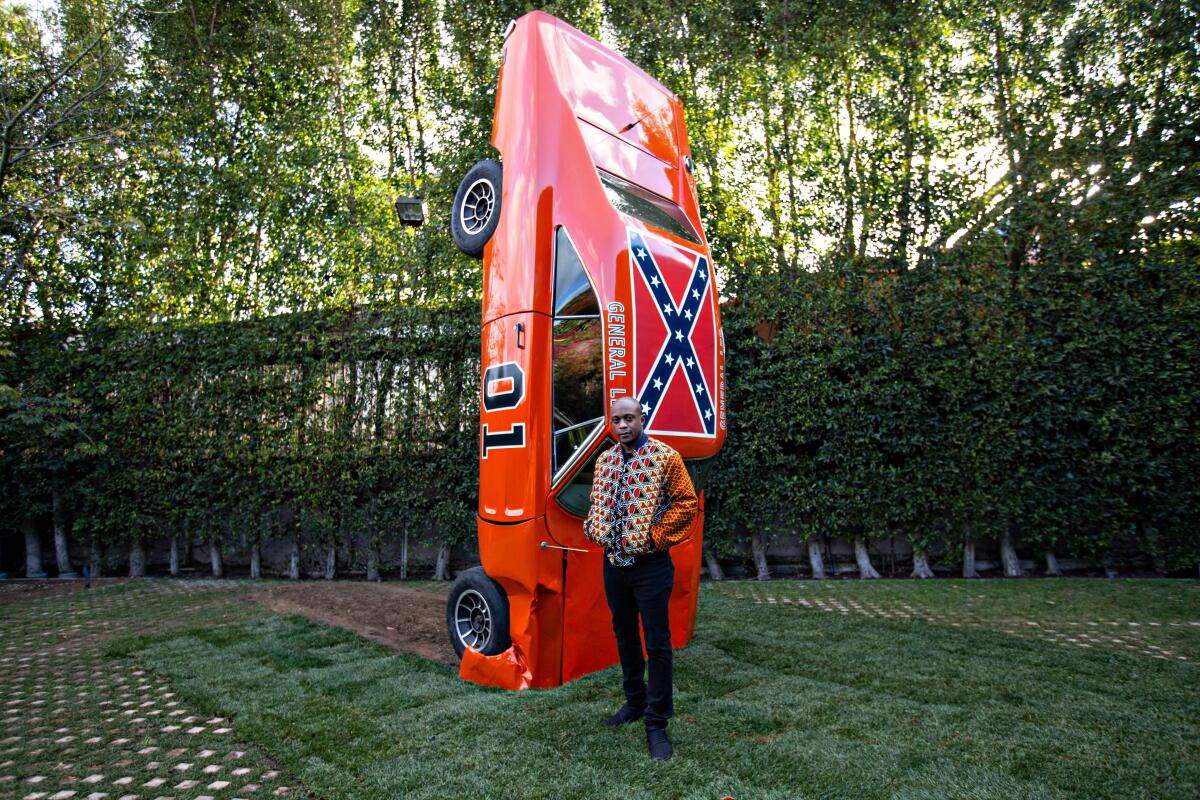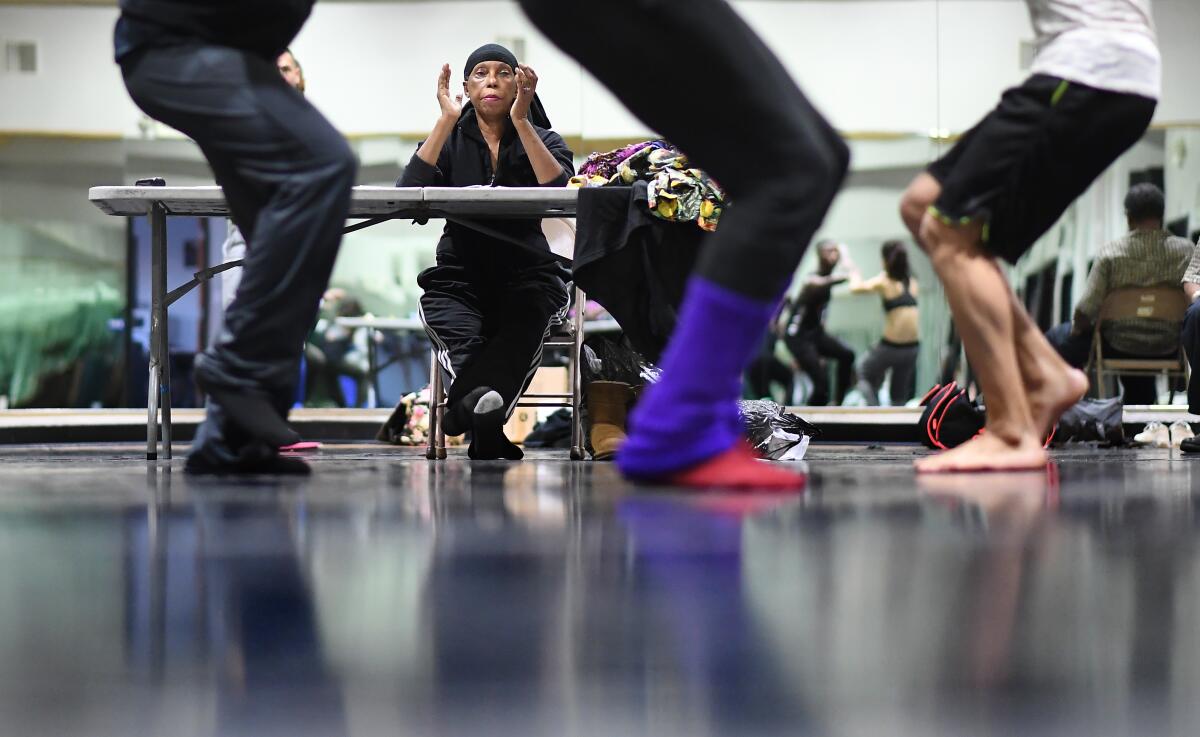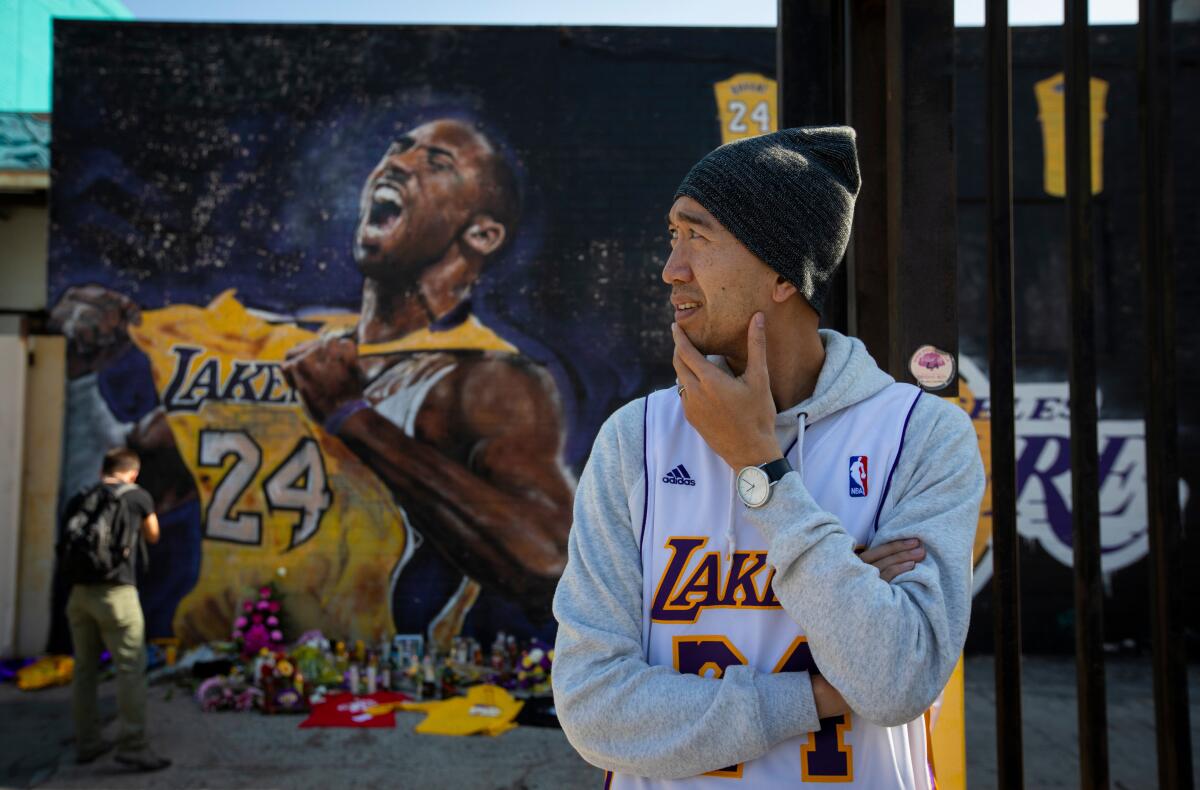Essential Arts: ‘Jagged Little Pill’ brings #MeToo to Broadway
Broadway gets serious. LACMA gets money. And a gallery in L.A. gets a smashed General Lee in its front yard. I’m Carolina A. Miranda, staff writer at the Los Angeles Times, with the week’s essential arts news — and diabolical art movie trailers:
Essential image
A photograph captures Thaddeus Phillips in a dramatic moment during his monologue “17 Border Crossings.” Times theater critic Charles McNulty says Phillips captures “telling details about place and period” in this “visual album of anecdotes.”
On the stage
“Sexual assault is not usually a topic central to commercial Broadway productions,” writes culture reporter Ashley Lee. “It is rare, some would say unprecedented, for the plot of a Broadway musical to be rooted so deeply in the subject.” But that is exactly what “Jagged Little Pill,” which features a book by Diablo Cody and music by rocker Alanis Morisette, is tackling onstage. “I’ve had this experience in my past,” says Morisette, “and I’m not afraid of talking about it.”
Charles McNulty reviews Dael Orlandersmith’s solo piece “Until the Flood,” now at the Kirk Douglas Theatre. The work “resembles a documentary collage by Anna Deavere Smith,” he writes. “But the rawness of the pain and poetry betrays Orlandersmith’s unmistakable stamp, as do the clarifying gusts of backlogged fury.”
Make the most of L.A.
Get our guide to events and happenings in the SoCal arts scene. In your inbox once a week.
You may occasionally receive promotional content from the Los Angeles Times.
If you’re in the mood for some lighter fare, Lee reports on an unauthorized “Never Been Kissed” musical at Rockwell Table & Stage. In this version of the story, the action takes place in L.A. instead of Chicago — and the lead character works for the Los Angeles Times. (I hear it’s a pretty good paper.)
Museum news
As Times art critic Christopher Knight reported late last year, LACMA had been stuck in first gear on fundraising for its planned Peter Zumthor-designed building. That appears to have changed. My colleague Deborah Vankin is reporting that the museum has secured a $50 million pledge from the W.M. Keck Foundation. Robert A. Day, chief exec for Keck, is a LACMA life trustee. This brings pledge commitments to $640 million.
In the galleries
At Fort Gansevoort, contributor Leah Ollman reviews a show of textile works by Christopher Myers that she describes as throwing “off a good many edifying sparks.” The exhibition is titled “Drapetomania,” after a fictional 19th century disorder invented by a quack medic to explain the desire among slaves to escape.
Enjoying this newsletter? Consider subscribing to the Los Angeles Times
Your support helps us deliver the news that matters most. Become a subscriber.
Contributor David Pagel has a look at a show of ceramic sculptures by Nina de Creeft Ward at South Willard gallery, which she has transformed “into a peaceable kingdom filled with earthly delights.” He also reviews John Sonsini’s portraits of day laborers at Vielmetter Los Angeles, images of working-class men that “are all about vulnerability and power — and the life-changing transformations that take place when those realities intermingle.”
Bang-up job
I profile artist Hank Willis Thomas, who has planted a facsimile of the General Lee — the bright orange Dodge Charger from TV’s “The Dukes of Hazzard” — nose down into the courtyard garden at Kayne Griffin Corcoran. Thomas, who frequently investigates the nature of images and their meanings, takes on issues of representation in Hollywood in this show. “My mother being a photographic historian, and thinking about how images of African Americans and images by African Americans were excluded from photographic history,” he tells me, “I grew up with the idea that there was always an alternate reality.”

Everything dance
The Times’ Makeda Easter profiles Lula and Erwin Washington, the founders of L.A.’s Lula Washington Dance Theatre, now celebrating its 40th anniversary. Lula is the artistic director; Erwin serves as administrator. “We put the company first above everything,” Erwin tells Easter. “I don’t think either of us has regretted this.”

Classical notes
Times classical music critic Mark Swed has been in a violin kind of mood — attending three unique concerts that offered “something new and unusual” and “gave evidence of marvelously incurable violin madness.” This included Andrew McIntosh’s sunset recital at Navel L.A., part of a series devised by Christopher Rountree; a show by Laurie Anderson at Disney Hall; and an “astonishing” performance by violinist Patricia Kopatchinskaja and cellist Jay Campbell in Montecito.
On the walls
When retired Lakers star Kobe Bryant died, his visage immediately popped up in new murals throughout the city. My colleagues Ruben Vives and Brittny Mejia look at the artistic ways L.A. honors its dead. And Chuck Schilken in Sports scoured social media for fan art made this week of Kobe with his daughter Gianna and other fallen L.A. heroes, including Nipsey Hussle.

Plus, as some murals go up, others come down. How mural whitewashing has become a symbol of gentrification.
Improving cities
This week, a stretch of San Francisco’s Market Street was placed off-limits to private cars — leaving loads more room for pedestrians, cyclists and public transportation. (The San Francisco Chronicle has a good explainer.)
This, of course, raises the question of when L.A. might start making similar sweet urban moves. Well, there is now a 90-page proposal afoot to put Hollywood Boulevard on a serious road diet. As my colleagues Laura Nelson and Priscella Vega report, this would mean wider sidewalks and more room for shade trees.
But perhaps we should be thinking about shutting down the street to cars entirely. (Hey, if they can do it for Oscars for two whole weeks, why can’t they do it for us plebes the rest of the year?) Alissa Walker, who has been making a case for this for a rilly rilly long time, lists the seven Los Angeles streets that should go car-free.
A devastating blaze
A terrible fire roared through the Museum of Chinese in America archives in New York City last weekend. Hua Hsu has a great piece on the history of the museum, and how it came to be. Thankfully, it appears that the fire didn’t destroy everything. Museum president Nancy Yao Maasbach said at a press conference that many objects were “very much salvageable.”
Ready for the weekend
Matt Cooper has the 10 best things to do around L.A., including a performance of the Lula Washington Dance Theatre. Plus, he looks at the week ahead in classical music, theater, museums and dance.
In my weekly Datebook, I round up all the latest art happenings, including solo shows by Alison Saar and Paul McCarthy, and a clay biennial at the Craft Contemporary.
In other news
— The weirdness that is St. Lucy and her extra set of eyes.
— It appears that a sculpture of a horned devil in the Getty Museum’s collection that was attributed to Gauguin may have been made by a Polynesian artist instead.
— “The average photograph has never been more banal or irrelevant, yet photography as a medium has never mattered more.” Jason Farago reviews the new International Center of Photography in New York.
— Daniel Oppenheimer pays tribute to art critic Dave Hickey. Good read.
— For those of us who geek out on archives: 10,000 photos documenting Alvin Ailey’s dances are now available online.
— There is now a virtual online tour of Frank Lloyd Wright’s Hollyhock House.
— Speaking of Wright, the Taliesin School of Architecture, based in Wisconsin and Arizona, will close after 88 years.
— Gustavo Dudamel and the L.A. Phil have picked up a Grammy Award for their recording of Andrew Norman’s “Sustain.”
— L.A. Opera has announced its 2020-21 season, which will feature Wagner’s “Tannhäuser,” Rossini’s “La Cenerentola” and the company premiere of Missy Mazzoli‘s 2016 hit “Breaking the Waves.”
— An opera that feels as if it has come off the nightly news: staging a modern version of Handel’s “Agrippina” at the Met in New York.
— Assembly Bill 5, intended to make it harder for companies to treat workers as independent contractors, also has instilled plenty of confusion about who exactly qualifies as a “fine artist.”
And last but not least ...
Mick Jagger as an evil art collector dude is what you need to get the weekend rolling.
The biggest entertainment stories
Get our big stories about Hollywood, film, television, music, arts, culture and more right in your inbox as soon as they publish.
You may occasionally receive promotional content from the Los Angeles Times.




